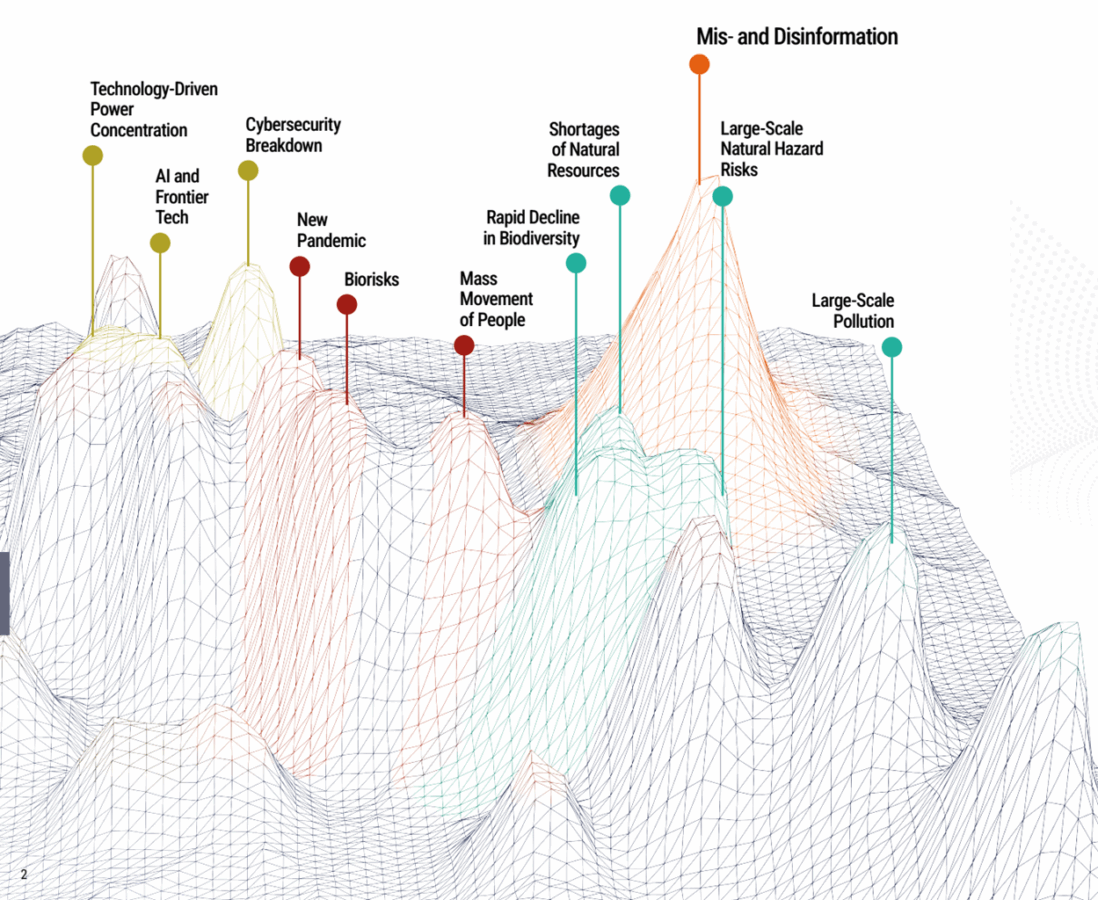The US government’s move to enact the fossil fuel industry’s agenda by basing climate and energy policy on official disinformation could cause us to despair. As my colleague Carlos Martinez recently wrote, “99% of the peer-reviewed scientific literature substantiates… human-caused climate change and its impacts.” But apparently, we must keep fighting the same lies, misrepresentations, and mischaracterizations—straight out of the disinformation playbook, delivered by the same people.
Am I infuriated? Yes, as many of us often are these days.
But am I despairing? No.
And that’s because there are good reasons to be hopeful that other parts of the world understands the twin crises posed both by climate change itself, and by disinformation campaigns against climate action. Those who profit from climate change also profit from disinformation. Tackling one requires tackling the other, and the work is underway. Here are three hopeful signs.
1. World organizations are clear-eyed about the problem
Every year, the World Economic Forum (WEF) collects findings from its Global Risks Perception Survey of 900 experts worldwide to capture insights about the world’s risks over the coming decade. In 2024, and again in 2025, these experts warn that over the next two years, “misinformation and disinformation are biggest short-term risks, while extreme weather and critical change to Earth systems are greatest long-term concern.” As the graph below shows, the experts appreciate:
- immediate and longer-term risks caused by climate change and other environmental degradation,
- a suite of risks connected to technology, including from disinformation but also from unregulated AI and cyberwarfare, and
- polarization and inequality that seems likely to be exacerbated by numbers one and two.

Source: WEF
In June 2025, the United Nations released its first-ever Global Risk Report after surveying “stakeholders in government, the private sector, civil society, and academia.” While the UN report doesn’t limit findings to a top ten list, the infographic reports survey findings remarkably like the WEF table, with climate impacts and technology-driven risks such as mis- and disinformation forming the peaks.


The UN Global Risk Report sorts risks into four categories: Technological, societal, environmental, and political. Mis- and disinformation and large-scale hazard risks are perceived by stakeholders surveyed to post the greatest threats. Source: UN Global Risk Report
In her recent report, the UN Special Rapporteur on the promotion and protection of human rights in the context of climate change wrote:
[C]limate misinformation practices through advertising have become a profit-making activity thanks to a revenue-sharing model with big tech (spreading misinformation on social media platforms by means of advertisements, including advertisements generated by artificial intelligence).
In various ways, then, international bodies are coalescing in their appreciation of these grave and related threats. They are acknowledging, whether implicitly or explicitly, that Big Tech and their allies are polluting our information ecosystem just as Big Oil (and other corporate and allied interests) are polluting our physical ecosystem, with the same bottomline motive: profit. This truth is no cause for celebration. But the clarity with which world bodies are recognizing these combined threats is.
2. Regions and nations can legislate for transparency, safety, and accountability
According to the Digital 2025 Global Overview Report, more than 5 billion people have social media accounts, and the typical user “spends 2 hours and 21 minutes using social media each day.” One source estimates that Google, the leading search engine, has 91.47% of the market share and processes 8.5 billion search requests a day. Social media platforms and search engines are ubiquitous in the lives of most people on the planet.
In highly developed economies, most goods and services we purchase—from a car to a box of cereal to a pair of socks—have mandated standards and practices to ensure:
- Transparency: we can know what’s in the socks and where they were made
- Safety: we have reason to assume the socks are safe to wear
- Accountability: we can hold the manufacturer accountable for failures of transparency or safety
It’s possible that more people use these online tools and spaces than regularly wear socks. And in some regions and countries, lawmakers are beginning to think that if socks must comply with standards, Big Tech should, too.
The European Union (EU) is now implementing the Digital Services Act (DSA), which does not yet cover climate change disinformation specifically, but does “mitigate against risks such as disinformation or election manipulation, cyber violence against women, or harms to minors online” and has pro-transparency regulations for online advertising and to grant researcher access. Meta and Apple have already been fined under the DSA. X (formerly Twitter) is under investigation, though the probe is reported be stalled amid EU/US trade talks.
On October 2, 2025, Meta (which owns Facebook, Whatsapp, and Instagram) was found in violation because it “customiz[es] users’ recommendation feeds based on their personal data.” A Dutch judge ruled that Meta must now “begin allowing users to easily choose a non-profiled recommendation system and not have their feed automatically revert to being based on their personal data every time they close the Facebook or Instagram apps.”
The DSA also requires companies to have “a crisis response mechanism in cases of serious threat for public health and security crises, such as a pandemic or a war.” The burning of fossil fuels poses cradle-to-grave risks to human health, including an estimated 8.34 million excess deaths worldwide every year from fine particulate and ozone pollution alone. That’s why UCS partners in the Climate Action Against Disinformation coalition are working to include climate disinformation as a serious threat under the DSA.
Other countries are also taking steps to increase online safety, especially for children. To the degree these measures increase accountability and transparency, they may also carry benefits in combating climate disinformation. A partial list: New Zealand has the Harmful Digital Communications Act, the UK and Australia have respective Online Safety Acts, and in September, Brazil passed ECA Digital. Three US states (California, Utah, and New York) have laws which protect user privacy and limit exposure to harmful content.
Another approach is governmental inquiry into how climate-related disinformation puts people at heightened risk, including during extreme weather events. Australia, for instance, has a Senate Select Committee on Information Integrity on Climate Change and Energy, to which UCS submitted a response and provided testimony. In the US, Senator Whitehouse and Representative Raskin chaired a similar bicameral inquiry focused on Big Oil’s climate disinformation, which released its report in 2024.
3. A multilateral effort is building momentum
At the 2024 G20 summit in Rio de Janeiro, the United Nations, the United Nations Educational, Scientific and Cultural Organization (UNESCO), and the Brazilian government formally launched the Global Initiative for Information Integrity on Climate Change. At that time, nations in Africa, Europe, and Latin America had already joined. The Initiative “aims to boost support for urgent climate action at a time when scientists are warning that the world is running out of time.” The Climate Action Against Disinformation coalition, which includes UCS, is a member of Initiative’s advisory group.
In its first policy brief, the Initiative explains its theory of change: how a reinforcing set of activities focusing on issues from education and literacy to independent research to policy change, will support a pluralistic and independent media environment, public awareness and resilience to disinformation, and human-rights based policies.
The Initiative recognizes that much of the capacity for work bolstering information integrity is based in the Global North. To address this inequity, in its first call for partnerships, it encouraged and prioritized projects from the Global South. The Initiative received 319 eligible proposals, nearly two-thirds from the Global South, and some of which are now funded.
For the first time this year, information integrity is on the agenda whenever nations meet to discuss climate change:
- This past June in Bonn, where the action agenda is set for the international climate negotiations that will take place at COP30 in Belém in just a few weeks’ time.
- In New York, during the UN General Assembly Climate Summit in September, 2025.
- And as a cross-cutting objective on the Action Agenda of COP30 in Brazil that would heed UN Secretary-General Guterres’ call to “fight mis- and disinformation, online harassment, and greenwashing.” (For more, read my colleague Rachel Cleetus’ blog on what to expect and watch for at COP30)
Fossil fuel companies’ lies and lobbyists have had an outsize influence on COP negotiations and outcomes. Big Tech has aided and abetted. Now that we have blown past a goal of the Paris Climate Agreement, our nations and our international institutions must thwart Big Oil and Big Tech from working together to deny climate science and solutions, deceive the public, and delay action.
Most people of the world want climate progress and are willing to contribute to it, but don’t know that their neighbors do too. Corporate interests are stopping us from seeing each other and wielding our power. I’m hoping the world will act strongly in favor of healthier information and planetary ecosystems in Belém.

